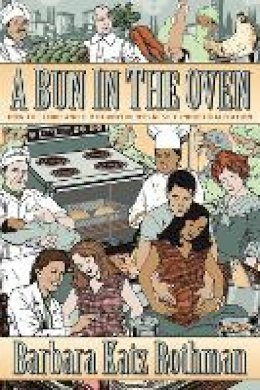
Bun in the Oven
Barbara Katz Rothman
There are people dedicated to improving the way we eat, and people dedicated to improving the way we give birth. A Bun in the Oven is the first comparison of these two social movements. The food movement has seemingly exploded, but little has changed in the diet of most Americans. And while there’s talk of improving the childbirth experience, most births happen in large hospitals, about a third result in C-sections, and the US does not fare well in infant or maternal outcomes.
In A Bun in the Oven Barbara Katz Rothman traces the food and the birth movements through three major phases over the course of the 20th century in the United States: from the early 20th century era of scientific management; through to the consumerism of Post World War II with its ‘turn to the French’ in making things gracious; to the late 20th century counter-culture midwives and counter-cuisine cooks. The book explores the tension throughout all of these eras between the industrial demands of mass-management and profit-making, and the social movements—composed largely of women coming together from very different feminist sensibilities—which are working to expose the harmful consequences of industrialization, and make birth and food both meaningful and healthy.
Katz Rothman, an internationally recognized sociologist named ‘midwife to the movement’ by the Midwives Alliance of North America, turns her attention to the lessons to be learned from the food movement, and the parallel forces shaping both of these consumer-based social movements. In both movements, issues of the natural, the authentic, and the importance of ‘meaningful’ and ‘personal’ experiences get balanced against discussions of what is sensible, convenient and safe. And both movements operate in a context of commercial and corporate interests, which places profit and efficiency above individual experiences and outcomes. A Bun in the Oven brings new insight into the relationship between our most intimate, personal experiences, the industries that control them, and the social movements that resist the industrialization of life and seek to birth change.
Product Details
About Barbara Katz Rothman
Reviews for Bun in the Oven
Ina May Gaskin,author of Spiritual Midwifery A Bun in the Oven is an erudite but fun read into these two worlds and how people struggle for identity, choice, voice and meaningful experiences in our increasingly industrialized world. The reader leaves with an understanding and appreciation for the struggles of both the food and birth movements and a sense of what these two, often overlapping, life-or-death important movements can learn from one another.
Jonathan Deutsch,co-author of Barbecue: A Global History Barbara Katz Rothman provides an unsettling comparison of two domains where women's labor has been colonized by men in the name of science and industry. In the process she gives a rare insight not only into what happens when the gap between everyday experience and expert knowledge is bridged in the name of professionalism, but also equips her readers with reasonable hope in cross-fertilizing lessons from the food and the natural birthing movements. Students, teachers and scholars will earn much in engaging with Katz Rothman's rich description and sharp critique.-Krishnendu Ray,author of The Migrant’s Table: Meals and Memories in Bengali
American Households
A sociologist in the world of midwifery is introduced to food studies, and spots parallelseverywhere with the world of birth. Her wittily named study ranges insightfully from JuliaChild to natural childbirth, and from Lamaze and Pavlov to labour times, Cesareans andkale chips as she considers how & birth and food, once so profoundly part of womensworld of production, ultimately came to be acts of consumption
Times Higher Education
Katz Rothman is at her most interesting when explaining why the modern medicalized birth which increases the speed and reduces the pain of labour is not always best for either mother or baby.
Times Literary Supplement
Katz Rothmans deep examination of the history of midwives and childbirth in America allows her to explore not only the birth and food movements of today, but also much more: capitalism, privilege, the meaning of home, and some might argue the meaning of life.
Feminist Collections
Rothman is passionate about her topic, and her writing style reflects her enthusiasm. The book is well-researched and fun and offers a useful model for the comparison of two important social movements.
Journal of American Culture
A Bun in the Oven is an intriguing, often startling reading, especially if you have never given much consideration to birth and all that implies. It is also a very personal and moving account, in which the author shares episodes of her own life, her reflection on death, life, and suffering, as well as more general considerations about authority, gender, and power.
Huffington Post
This book is intended for gender and womens studies, sociology, anthropology, and medical studies audiences, but would be useful also for psychologists interested in womens health, health psychology, and feminist psychology. The authoritative sociological and historical background that Rothman places the activities of eating and giving birth provides an extremely useful context from which to study individual choices and social behavior.
PsycCRITIQUES
This book is readable, authoritative, and thoughtful. Its combination of scholarly expertise and heart-on-its-sleeve advocacy gives it a distinct voice that is sure to provoke reaction especially if it is, as Rothman and I would hope, taken up by readers who are not already foodies and birthies.
North American Dialogue
